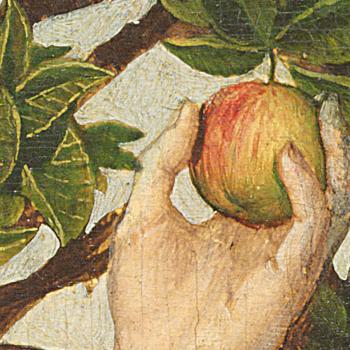By Sandra Lommasson
Note: Each week's reflection is intended for communal examination with at least one other person in a small faith, work, or family community as part of the annual six-week ‘retreat' of Lent. The intent is to notice with freshness our own impact in a community and to name that aloud to others in the community in mutual revelation. See the introduction to the series, "Tending the Communal Laundry," for more on this approach.
For the third, fourth, and fifth weeks of Lent we turn to the three ‘scrutinies' that come from John's gospel (cycle A) as part of the annual process of mutual self-reflection between those soon to be baptized and the community receiving them. In years B and C, the stories for these Sundays amplify the same themes. The story of the Prodigal Son develops the same concern as John's great story of the Man Born Blind.
 John 9:1-41
John 9:1-41
"Rabbi, who sinned, this man or his parents, that he was born blind?"
The need to draw lines marking who is inside and outside, right and wrong is such an embedded quality of human community that this second of the three great stories of examination during the annual Lenten retreat zeroes in on it.
New converts in the early church faced a dilemma, as do we in our communities today. A living experience of Jesus the Christ floods us with startling, joyful clarity as we are released from life-long blindness into seeing the heart of God. What we ‘see' is Unimaginable Love and it enfolds us and all. It changes everything -- eventually -- including our old relationships and understandings. Meanwhile, the old habits and structures perceive a threat and quickly mount an assault against the new experience. One directee speaks of the killing voices inside her that follow any genuine experience of the presence of God, ‘stealing it away.'
These are the ‘Pharisee' voices of John's story -- and the elder brother of Luke's gospel -- voices that sometimes reside inside us and sometimes come from around us to diminish the experience and return us to the old normal. Their focus is analytic ("How can this be?") and dismissive ("It can't be because..."). Take your pick of reasons why. Clearly, waking up to God threatens much!
That's why norms and practices that support a new identity in Christ are so essential. Real honesty, ongoing discernment, and authentic humility in community are necessary to sift and sort which voices hold both spirit andtruth and which don't. It's God's work in us preparing us for service in the world, which will often misunderstand the gift we bear and resort to mistreating the one who bears it.
And yet, these norms and practices can easily harden into new impermeable, self-protective structure. ‘Seeing the light' -- enlightenment -- does not mean the work of God in us is complete. We will never be finished. The inclination to create new lines defining insiders and outsiders is an ever-present companion, and can harden the heart into unnecessary exclusion of those who do not see as I/we see.
The shift is subtle from following the Way of Christ into thinking we have the way as a personal possession. Possession is always a two-way street. What we think we possess in fact possesses us, and the resulting ‘gift' we offer is anything but the wide-open experience of Grace we have received. This is when we find ourselves doing what I once heard Alexander Shaia describe as "serving wedding cake with ground glass in it."
New seeing -- awakening or illumination -- is the experience of John's mystical Gospel, and yet in the 4-part progression is only the 3rd of 4 movements. It's not the end point. The energy of joyful awakening is energy for the transformative, on-the-ground, daily work of service that will eventually follow; it's not the answer. Forgetting that fractures our communities and sullies the gift we have to offer the world.
The story of the healing of the man born blind suggests at least two attitudes that help us stay open to the Grace that claims us without converting it to our own small purposes.
First, is the recognition that there is no sin in unawareness or unconsciousness. There is blindness and limitation, but not a willful separation from the desire of God's heart for us: "Neither this man nor his parents sinned; he was born blind so that God's works might be revealed in him" (Jn. 9:3). In essence, the blind man is us. We are born with a capacity for conscious relationship with the Holy that is not yet developed. "Remember, John is not literal," says Alexander Shaia in The Hidden Power of the Gospels:




